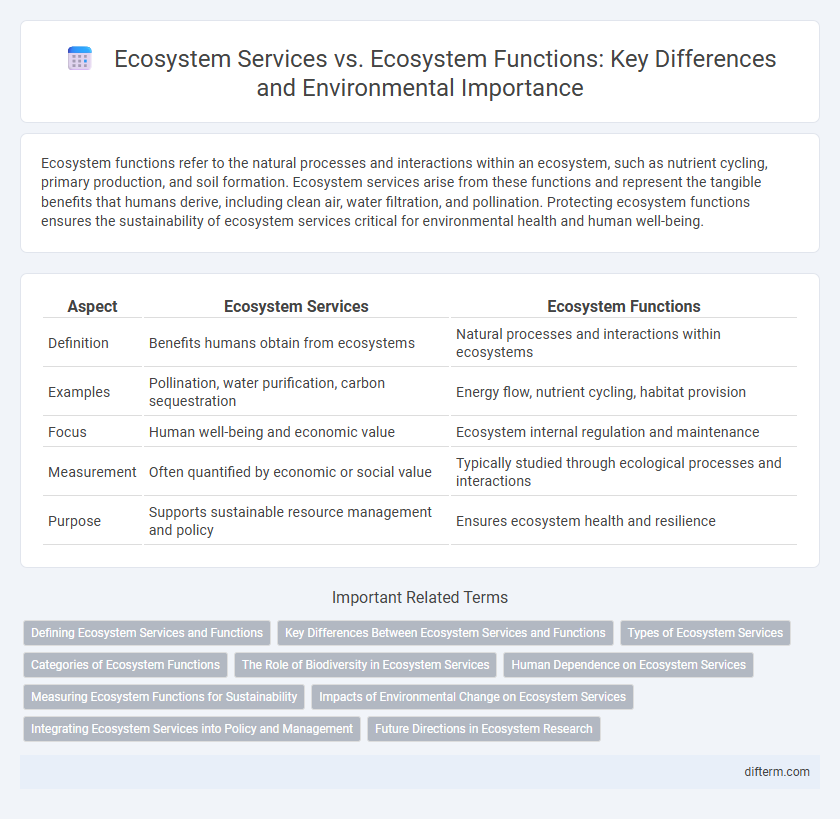Ecosystem functions refer to the natural processes and interactions within an ecosystem, such as nutrient cycling, primary production, and soil formation. Ecosystem services arise from these functions and represent the tangible benefits that humans derive, including clean air, water filtration, and pollination. Protecting ecosystem functions ensures the sustainability of ecosystem services critical for environmental health and human well-being.
Table of Comparison
| Aspect | Ecosystem Services | Ecosystem Functions |
|---|---|---|
| Definition | Benefits humans obtain from ecosystems | Natural processes and interactions within ecosystems |
| Examples | Pollination, water purification, carbon sequestration | Energy flow, nutrient cycling, habitat provision |
| Focus | Human well-being and economic value | Ecosystem internal regulation and maintenance |
| Measurement | Often quantified by economic or social value | Typically studied through ecological processes and interactions |
| Purpose | Supports sustainable resource management and policy | Ensures ecosystem health and resilience |
Defining Ecosystem Services and Functions
Ecosystem functions refer to the natural processes and interactions within an ecosystem, such as nutrient cycling, pollination, and energy flow, that sustain ecological health. Ecosystem services are the direct and indirect benefits humans derive from these functions, including clean air, water filtration, food production, and climate regulation. Understanding the distinction helps in valuing and managing ecosystems for sustainable development and biodiversity conservation.
Key Differences Between Ecosystem Services and Functions
Ecosystem functions refer to the natural processes and interactions, such as nutrient cycling and energy flow, that sustain ecosystem health and stability. Ecosystem services are the direct and indirect benefits humans derive from these functions, including clean water, air purification, and pollination. The key difference lies in ecosystem functions being the biological and physical processes, while ecosystem services specifically highlight the value of these processes to human well-being.
Types of Ecosystem Services
Ecosystem services are the direct benefits humans obtain from ecosystems, classified into provisioning, regulating, cultural, and supporting services. Provisioning services include resources like food, water, and timber, while regulating services encompass climate regulation, flood control, and disease management. Cultural services provide recreational, spiritual, and educational benefits, and supporting services involve nutrient cycling and soil formation essential for ecosystem sustainability.
Categories of Ecosystem Functions
Ecosystem functions encompass natural processes such as energy flow, nutrient cycling, and soil formation that sustain ecosystem health and productivity. These functions serve as the foundation for ecosystem services, which provide direct benefits to humans like pollination, water purification, and climate regulation. Categories of ecosystem functions include provisioning, regulating, supporting, and cultural processes that collectively maintain ecological balance and human well-being.
The Role of Biodiversity in Ecosystem Services
Biodiversity underpins ecosystem services by maintaining ecosystem functions such as nutrient cycling, pollination, and water purification that directly support human well-being. Diverse species interactions enhance ecosystem resilience, ensuring the stability and productivity of services like food provision and climate regulation. Protecting biodiversity is essential for sustaining these vital ecosystem services that communities and economies depend on.
Human Dependence on Ecosystem Services
Ecosystem services represent the direct benefits that humans derive from natural ecosystems, including food provision, water purification, and climate regulation, which are critical for sustaining human life and economic activities. These services stem from underlying ecosystem functions, such as nutrient cycling and energy flow, that maintain ecosystem health and resilience. Understanding the intricate connection between ecosystem functions and services highlights the urgent need for conservation efforts to ensure continued human well-being and environmental stability.
Measuring Ecosystem Functions for Sustainability
Measuring ecosystem functions involves quantifying biological, chemical, and physical processes such as nutrient cycling, primary productivity, and soil formation, which underpin ecosystem services essential for sustainability. Accurate assessment of these functions enables better evaluation of ecosystem health and resilience, supporting informed decision-making for resource management. Integrating remote sensing technologies and ecological modeling enhances the precision and scalability of ecosystem function measurements to guide sustainable environmental practices.
Impacts of Environmental Change on Ecosystem Services
Environmental change disrupts ecosystem functions such as nutrient cycling, pollination, and habitat provision, leading to degraded ecosystem services including food production, water purification, and climate regulation. Alterations in temperature, precipitation patterns, and land use intensify these impacts, reducing biodiversity and ecosystem resilience. This decline directly threatens human well-being by undermining the natural systems that sustain agriculture, clean water, and disaster risk reduction.
Integrating Ecosystem Services into Policy and Management
Integrating ecosystem services into policy and management enhances sustainable decision-making by valuing benefits such as pollination, water purification, and carbon sequestration. Ecosystem functions, which are natural processes like nutrient cycling and energy flow, underpin these services but require translation into actionable frameworks for effective governance. Policies incorporating ecosystem services promote resilience and biodiversity conservation while balancing economic development and environmental stewardship.
Future Directions in Ecosystem Research
Emerging research emphasizes distinguishing ecosystem services, which directly benefit human well-being, from ecosystem functions, the natural processes supporting these services, to enhance targeted conservation strategies. Future directions involve integrating advanced modeling techniques and geospatial data analytics to predict how climate change and land-use alterations affect these systems. Emphasizing multidisciplinary approaches, researchers aim to quantify ecosystem services' socio-economic value, improving policy frameworks that foster sustainable ecosystem management.
ecosystem services vs ecosystem functions Infographic

 difterm.com
difterm.com